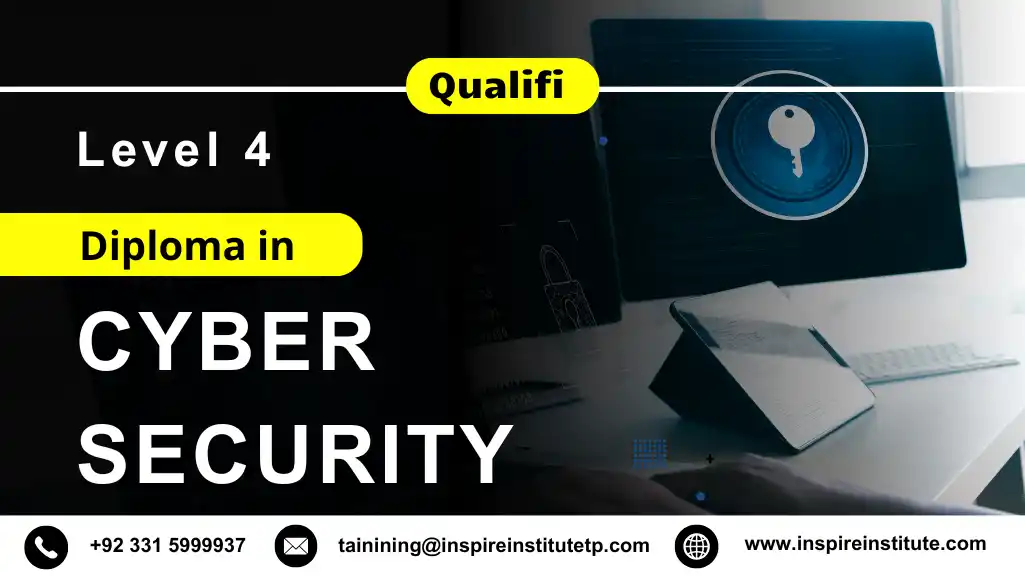Qualifi Level 4 Diploma in Cyber Security
The Qualifi Level 4 Diploma in Cyber Security is a UK-regulated qualification designed to equip learners with a thorough understanding of the principles, practices, and tools used to protect information systems and digital assets. As cyber threats continue to grow in complexity and scale, the demand for skilled cybersecurity professionals is at an all-time high. This diploma offers a structured and practical entry point into one of the most critical fields in modern information technology.
Awarded by Qualifi, a UK-based awarding body regulated by Ofqual (Office of Qualifications and Examinations Regulation), the qualification is internationally recognised and aligned with industry best practices. It prepares learners to assess security risks, implement protective measures, respond to cyber incidents, and understand the ethical and legal implications of cybersecurity.
Why Choose this Qualification
The Qualifi Level 4 Diploma in Cyber Security offers a professionally designed and industry-relevant foundation for learners seeking to enter or advance in the growing field of digital security. With global cybercrime on the rise, this qualification equips students with practical tools, theoretical knowledge, and career-ready skills that are essential in today’s threat-prone digital environment. Here’s why this diploma is a smart choice:
- UK-Regulated and Internationally Recognised
This diploma is awarded by Qualifi, an Ofqual-regulated awarding body in the UK. It provides international recognition, academic credibility, and professional value—making it ideal for learners worldwide. - Industry-Relevant Curriculum
The course covers core topics such as network security, cyber threat analysis, ethical hacking, digital forensics, encryption, and risk management—all aligned with real-world security challenges and industry needs. - No Exams – Assignment-Based Assessment
Learners are assessed through practical assignments, case studies, and projects, allowing them to demonstrate applied knowledge without the pressure of formal examinations. - Hands-On Learning for Career Readiness
The programme incorporates practical activities, lab simulations, and investigative tasks that mirror workplace responsibilities, preparing students for entry-level roles in cybersecurity or further study. - Flexible Study Options
Delivered by approved centres via online, blended, or classroom formats, the course accommodates diverse learning needs—ideal for working professionals, recent graduates, and international learners. - Pathway to Further Study and Employment
This Level 4 qualification enables progression to the Qualifi Level 5 Diploma in Cyber Security or second-year entry into relevant bachelor’s degree programmes in IT, cyber security, or information systems. - Global Demand for Cybersecurity Professionals
Organisations across sectors—from finance and healthcare to government and education—require skilled security professionals. This diploma helps learners build the competence needed for roles such as:
• Security Analyst
• Network Security Officer
• Cybersecurity Technician
• IT Security Support Staff - Learn Ethical and Legal Responsibilities
The course introduces learners to cyber law, ethical frameworks, and data protection regulations, preparing them to navigate legal compliance and ethical conduct in their careers. - Supports Professional Certifications
The knowledge gained through this course aligns with the objectives of global certifications such as CompTIA Security+, CEH (Certified Ethical Hacker), and CISSP (Associate level)—making it a valuable step toward specialised credentials. - Ideal for Beginners and Upskillers Alike
Whether you’re starting from scratch or enhancing your current IT knowledge, this qualification provides an accessible, structured, and professionally guided learning journey into the world of cybersecurity.
Choosing this diploma means gaining not only a solid academic qualification but also the technical confidence and strategic insight to help defend digital systems, protect sensitive data, and contribute meaningfully to a safer digital future.
Course Overview
Ofqual Regulated Qualification
Course Level: 4
Average Completion Time:
6-12 Months
Study Units: 7 Units
Evidence & Assignment Based
Qualification Structure
The Qualifi Level 4 Diploma in Cyber Security qualification consists of 7 mandatory units of 120 credits for the completed qualification.
Mandatory
- Cyber Security Threat and Risk
- Network Security and Data Communications
- Database Security and Computer Programming
- Incident Response, Investigations and Forensics
- Security Strategy: Laws, Policies and Implementation
Optional (1)
- Cyber Security Threats and Risk: Banking and Finance
- Cyber Wars
Who Should Take This Course
The Qualifi Level 4 Diploma in Cyber Security is designed for a broad audience of learners who are interested in understanding and working within the field of digital security. Whether you’re new to the industry or looking to build on existing IT knowledge, this course provides a comprehensive foundation. It is ideal for:
- Aspiring Cybersecurity Professionals
Individuals who wish to launch a career in cyber security, ethical hacking, or information assurance and want to begin with a strong, structured academic qualification. - IT and Network Support Technicians
Professionals currently working in IT support, system administration, or networking roles who want to expand their skills into the high-demand field of cyber defence and risk mitigation. - Technology and Engineering Students
Learners studying computer science, engineering, or technology-related disciplines who want to specialise in the cybersecurity domain. - Career Changers from Other Fields
Individuals with little or no formal IT background who are seeking a career transition into the fast-growing and stable cybersecurity industry. - Graduates of Level 3 IT Qualifications
Students who have completed Level 3 diplomas or equivalent in IT, computing, or a related subject and want to progress to higher-level study or gain practical skills for employment. - Professionals in Risk, Compliance, or Law
Those involved in corporate compliance, auditing, or data protection who want to understand the technical aspects of cybersecurity and digital risk management. - Entrepreneurs and Small Business Owners
Individuals running small businesses who wish to better protect their digital infrastructure and learn how to manage cybersecurity challenges in-house. - International Students Seeking a UK-Regulated Qualification
Learners from abroad who want an affordable, flexible, and globally recognised entry point into cybersecurity studies, with options to study online or in blended formats. - Public Sector or Defence Personnel
Members of the armed forces, law enforcement, or public agencies interested in foundational cyber operations, digital forensics, and secure information systems.
Whether your goal is to enhance job security, transition into a tech-forward industry, or continue to a degree-level qualification, this course provides the critical skills and knowledge to meet your objectives in the ever-evolving field of cybersecurity.
Course Benefits
The Qualifi Level 4 Diploma in Cyber Security delivers practical, career-focused benefits for individuals seeking to build expertise in protecting digital systems and data. As cyber threats increase in frequency and sophistication across the globe, this qualification empowers learners with the skills, knowledge, and confidence to enter the field of cybersecurity or progress academically. Key benefits include:
- UK-Regulated, Internationally Recognised Qualification
Awarded by Qualifi and regulated by Ofqual (UK), this diploma is recognised globally and enhances your credibility in both academic and professional settings. - Strong Foundation in Cybersecurity Principles
Gain critical knowledge in network security, cryptography, ethical hacking, malware threats, cyber law, digital forensics, and more—building the theoretical and practical foundation needed to thrive in a cybersecurity role. - No Traditional Exams – Assignment-Based Assessment
Learners are assessed through practical assignments, projects, and case studies, ensuring real-world application of knowledge without the stress of written exams. - Pathway to Higher Education and Advanced Training
The diploma enables progression to the Qualifi Level 5 Diploma in Cyber Security or entry into the second year of a university degree in IT, information security, or a related subject. - Career-Ready Skills for a High-Demand Industry
The course equips learners with practical tools and decision-making strategies needed for roles such as:
• Cybersecurity Technician
• Security Analyst
• IT Support Specialist
• Network Security Associate
• Risk and Compliance Officer - Aligned with Global Cybersecurity Certifications
The content supports learners preparing for further professional certifications such as CompTIA Security+, CEH (Certified Ethical Hacker), or Cisco CyberOps, enhancing their employability. - Flexible Learning Options
Offered through online, blended, or in-person formats, the course supports flexible study—ideal for professionals, career changers, and international learners balancing other commitments. - Hands-On Learning with Real-World Relevance
Learners explore current threats, investigate simulated incidents, and engage in practical exercises using industry tools—developing the problem-solving and analytical skills expected in today’s security roles. - Supports Ethical and Legal Understanding
Learn how to operate within legal frameworks and uphold ethical standards while managing security operations and responding to digital threats responsibly. - Broad Industry Applicability
Cybersecurity skills are essential across all sectors—finance, healthcare, government, education, retail, and tech—making this diploma relevant for a wide range of career paths. - Supportive Academic Environment
Learners benefit from expert tutor guidance, peer collaboration, and interactive resources to ensure a productive and enriching educational experience.
Whether you are starting your cybersecurity journey, seeking a promotion, or looking to specialise in digital risk and security, the Qualifi Level 4 Diploma in Cyber Security provides the ideal platform to achieve your goals in this vital and evolving industry.
Eligibility Criteria
To ensure learners are well-prepared for the academic and technical demands of the Qualifi Level 4 Diploma in Cyber Security, certain eligibility standards must be met. These criteria are designed to ensure learners can successfully engage with the course content and progress to advanced study or employment. The eligibility requirements include:
Minimum Age Requirement
• Applicants must be 18 years of age or older at the time of enrolment.
Academic Qualifications
• A Level 3 qualification (such as A-levels, BTEC, or equivalent) is generally required, preferably in IT, computing, mathematics, science, or a related subject.
• Alternatively, applicants with a high school diploma or secondary education certificate with a strong academic record in relevant subjects may also be considered.
Mature Learners with Experience
• Mature learners (aged 21 and above) who do not meet the formal qualification criteria may be admitted based on relevant work experience in IT, networking, or a related field.
• A CV and personal statement may be required to demonstrate suitability for the course.
English Language Proficiency
• Learners must have a good command of English. This can be demonstrated through:
– An IELTS score of 5.5 or equivalent
– Completion of previous studies in English
– Internal English assessment by the approved centre (if needed)
IT Literacy
• Applicants should possess basic computer skills, including familiarity with using operating systems, internet tools, and software applications.
• Some understanding of networking or cybersecurity concepts is beneficial but not mandatory.
These entry requirements ensure that learners are academically and practically prepared to take full advantage of the learning experience offered by the Qualifi Level 4 Diploma in Cyber Security. Institutions may also conduct interviews or pre-admission assessments to confirm learner readiness.
The Qualification Process
The qualification process for the Qualifi Level 4 Diploma in Cyber Security provides learners with a structured, practical, and academically rigorous pathway to developing strong foundational skills in digital security. It supports learners from enrolment to certification, ensuring academic integrity and real-world readiness.
• Application and Admission
Learners apply through a Qualifi-approved training centre. During the admission process, candidates are required to:
• Submit academic qualifications and supporting documents
• Provide proof of English language proficiency (if applicable)
• Complete a personal statement or CV (for mature learners)
After evaluation, successful applicants are offered a place in the programme.
• Enrolment and Orientation
Upon accepting the offer, learners are officially enrolled and gain access to:
• Online learning portals or classroom schedules
• Course materials and study guides
• Orientation sessions explaining course structure, assessments, and available support
• Course Delivery
The diploma is delivered through online, blended, or classroom-based formats, depending on the institution. Learners study key units that cover topics such as:
• Cybersecurity Fundamentals
• Network and Infrastructure Security
• Threat Intelligence and Risk Management
• Cryptography and Secure Communications
• Cyber Law and Digital Ethics
• Digital Forensics and Incident Response
The course balances theoretical knowledge with practical application.
• Tutor Support and Learning Resources
Throughout the programme, learners receive continuous academic support, including:
• Access to qualified tutors and subject matter experts
• Digital resources, recorded lectures, and reading materials
• Interactive forums and collaboration tools for peer discussion
• Assessment and Evaluation
There are no traditional written exams. Instead, learners are assessed through:
• Coursework and assignments
• Practical projects and simulations
• Case study analysis and reports
• Security risk assessments and forensic investigations
Each unit includes specific assessment criteria, graded as Pass, Merit, or Distinction.
• Internal Review and Feedback
Assessments are internally marked by course tutors who provide structured feedback, helping learners understand their strengths and areas for improvement.
• External Verification and Quality Assurance
After internal assessment, Qualifi conducts external verification to ensure:
• Fair and consistent assessment practices
• Compliance with academic standards
• Integrity of the qualification process
• Certification and Award
Learners who complete all units and meet assessment standards are awarded the Qualifi Level 4 Diploma in Cyber Security, recognised on the UK Regulated Qualifications Framework (RQF).
• Progression Opportunities
Graduates can:
• Advance to the Qualifi Level 5 Diploma in Cyber Security
• Progress to the second year of a bachelor’s degree (subject to university entry criteria)
• Apply for entry-level roles such as IT Security Technician, Junior Cyber Analyst, or Network Security Associate
• Pursue globally recognised certifications such as CompTIA Security+, CEH, or CISSP (associate level)
This qualification process ensures learners graduate with both the theoretical understanding and practical tools needed for success in the fast-evolving field of cybersecurity.







